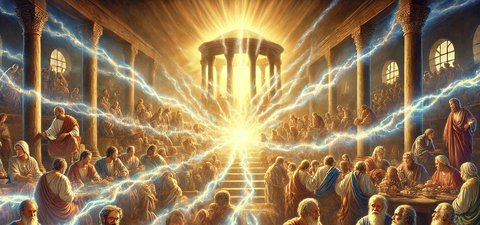Unity is a cornerstone of God’s nature and a call to every believer. The Godhead—Father, Son, and Holy Spirit—demonstrates perfect unity, a model for how we should live and relate to one another. Let us explore the beauty and significance of this unity and how it applies to our walk with God and others.
The Voice of Many Waters: Unity in the Godhead
In Revelation 1:15, Jesus is described as speaking with "the voice of many waters," a powerful image of harmony and unity. This signifies that when one in the Godhead speaks, it is as though all are speaking together. The unity of the Godhead is a seamless collaboration, without division or rivalry.
This unity is first revealed in Genesis 1:26, when God said, “Let us make man in our image, after our likeness.” Here, the plural pronouns “us” and “our” highlight the triune nature of God—the Father, the Son, and the Holy Spirit—working together in perfect accord.
Another powerful revelation of the Godhead's unity appears in Isaiah 48:16:
"Come near to Me, hear this: I have not spoken in secret from the beginning; from the time that it was, I was there. And now the Lord God and His Spirit have sent Me."
This verse reveals the collaborative operation of the Godhead, where the Lord God and His Spirit send forth the Messenger—Jesus Christ. Together, they act, speak, and work as one.
Unity in the Church: Lessons from the Acts Church
The early church modeled this unity beautifully, as seen in Acts 2:46:
"And they, continuing daily with one accord in the temple, and breaking bread from house to house, did eat their meat with gladness and singleness of heart."
The Acts church lived in harmony, with shared resources, shared burdens, and shared joy. This unity enabled the power of the Holy Spirit to flow mightily among them, resulting in growth, miracles, and transformation.

Jesus Himself prayed for this unity in John 17:11:
"Holy Father, keep through thine own name those whom thou hast given me, that they may be one, as we are."
Christ's desire is that His followers reflect the same unity He shares with the Father and the Holy Spirit—a unity marked by selflessness and love.
What Does It Mean to Uphold Unity?
To uphold unity is to live a life fully surrendered to God. In Galatians 2:20, Paul declares,
"I am crucified with Christ: nevertheless I live; yet not I, but Christ liveth in me."
When we are united with Christ, we no longer act out of selfish ambition. Instead, Christ lives and works through us, enabling us to reflect His selflessness.
Consider this: Have you ever seen Jesus declare Himself better than the Father? Or the Holy Spirit claim superiority? Never. When one speaks, they all speak as one. This is the unity we are called to—so aligned with God’s will that when we speak or act, it is God’s voice and nature being expressed, not our own selfish desires.
David’s Example of Unity and Selflessness
An excellent example of unity is found in 1 Samuel 30:21-25, where David and his men returned to Ziklag after recovering their families and spoils of war. Some men argued that only those who fought in the battle should share the spoils. However, David insisted that all should receive an equal share, saying:
"The share of the man who stayed with the supplies is to be the same as that of him who went down to the battle. All will share alike."
David's decision upheld the principle of selflessness and unity. By treating everyone equally, regardless of their role, he demonstrated the importance of valuing every member of the community.
The Mystery of the Church: Unity as the Bride of Christ
In Ephesians 5:22-33, Paul uses the relationship between husband and wife to illustrate the unity between Christ and the Church. He writes:
"This is a great mystery: but I speak concerning Christ and the church."
Marriage reflects the oneness and selflessness God desires for His people. Just as a husband and wife are to be united, so too is the Church called to be one with Christ. This unity is under constant attack by the enemy, who seeks to sow division through selfishness, malice, and pride.
The Enemy’s Strategy: Disunity and Selfishness
Satan’s primary weapon against believers is disunity. Whenever there is dissension, hatred, or selfish ambition, the enemy gains a foothold. James 3:16 warns,
"For where envying and strife is, there is confusion and every evil work."
Disunity leads to selfishness, which directly opposes the selflessness modeled by Christ and the Godhead. To maintain unity, we must resist the enemy by submitting to God, as instructed in James 4:7:
"Submit yourselves therefore to God. Resist the devil, and he will flee from you."
Living in Unity: A Daily Commitment
Unity requires intentional effort. It involves dying to self daily, putting others first, and allowing God to work through us. In Matthew 22:37-40, Jesus highlights the foundation of unity:
"Thou shalt love the Lord thy God with all thy heart, and with all thy soul, and with all thy mind. This is the first and great commandment. And the second is like unto it, Thou shalt love thy neighbour as thyself."
When we love God fully and love others selflessly, unity naturally follows.
Let’s Conclude
The unity of the Godhead is a profound mystery and a divine example for us to emulate. Whether in our personal walk with Christ, our relationships with others, or our role in the Church, we are called to reflect this unity. Let us strive to live in selflessness, walking in harmony with God and others, so that when we speak or act, it is not us but God who is glorified.
“Behold, how good and how pleasant it is for brethren to dwell together in unity!” – Psalm 133:1
Comments